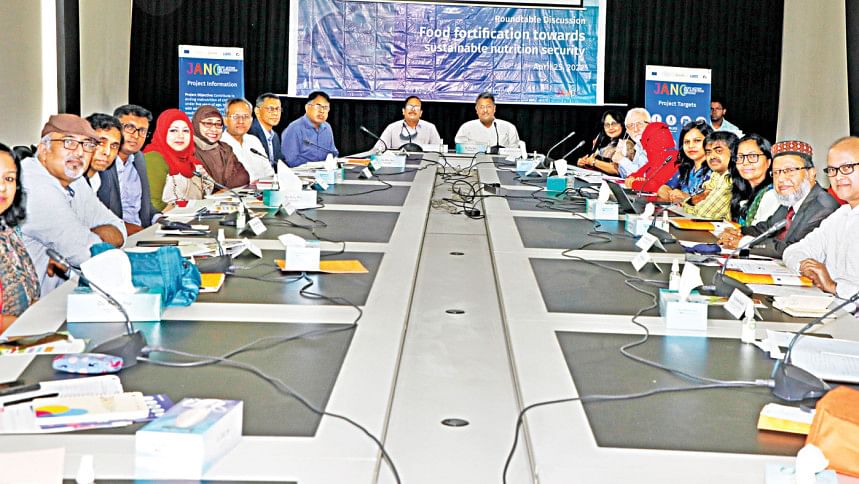Lack of knowledge, poverty key barriers

Poor household income and lack of knowledge are among the reasons hindering people's choice to consume fortified food in parts of Rangpur and Nilphamari districts, according to a report of International Centre for Diarrhoeal Disease Research, Bangladesh (icddr,b).
The report was shared yesterday during a discussion on "Food Fortification towards Sustainable Nutrition Security" jointly organised by CARE Bangladesh, Plan International Bangladesh, Eco-Social Development Organisation (ESDO) and The Daily Star held at The Daily Star Centre in the capital.
The icddr,b research was conducted under "Joint Action for Nutrition Outcome", funded by European Union and Austrian Development Cooperation.
Food fortification has received worldwide recognition for its potential to address the issue of micronutrient deficiency as one of the most cost-effective strategies to increase the regular consumption of micronutrients, the report says.
One of the health consequences of micronutrient deficiency is anemia, caused by iron deficiency, and remains one of the biggest public health concerns in Bangladesh, it says.
Food fortification is the practice of deliberately increasing the content of one or more micronutrients (i.e., vitamins and minerals) in a food or condiment to improve the nutritional quality of the food supply and provide a public health benefit with minimal risk to health, according to the WHO.
The report says 37 percent of respondents had faced difficulty in buying fortified food and 40 percent had not been able to buy fortified foods.
The most common reason mentioned for not being able to buy fortified food during Covid-19 was decrease in income (97 percent), it says.
It adds that only 41 percent of respondents had heard about fortified food, and among them, 52 percent did not know the process of food fortification.
Less than half of respondents (48.9 percent) were using other fortified food in addition to iodised salt. Almost all the respondents knowingly consumed iodised salt and knew that packaged salts are iodised, it says.
It recommended that although the target population comprises pregnant and lactating women and adolescents, husbands and household heads should also be informed of micronutrient deficiencies and ways to address it.
Alongside key informant interviews and in-depth interviews, household survey of 507 women was held during the research in 14 villages. Quantitative and qualitative data was collected simultaneously but independently between August and September 2021.
Bidhan Krishna Sarker, assistant scientist at icddr,b, presented the report.
Addressing the event, additional secretary of the agriculture ministry Ruhul Amin Talukder said the government has taken different initiatives focusing both quality and quantity of all kinds of food including those fortified.
He stressed for motivating people regarding consumption of fortified food.
ESDO Executive Director Shahid Uz Zaman, CARE Bangladesh Country Director Ramesh Singh, Plan International Bangladesh Country Director Dennis O'Brien and Delegation of the European Union to Bangladesh Programme Manager Meher Nigar Bhuiyan, among others, spoke at the event.

 For all latest news, follow The Daily Star's Google News channel.
For all latest news, follow The Daily Star's Google News channel. 




Comments